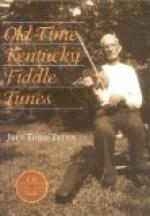For an instant he stood wavering, as if he were considering the plan of trying to depart without approaching them or being seen by them, but then he shrugged his shoulders and advanced, trying to show upon his face surprised good-nature.
“Wall, Colonel Doolittle!” he cried. “And you, Miss Layson, and—why, there’s Barbara!”
“Father!" said the girl, in absolute amazement, hurrying toward him.
“Ah, Mr. Holton!” said Miss ’Lethe, bowing to him as the Colonel, plainly not too greatly pleased by the necessity for doing so, advanced toward him with extended hand.
“What brings you all up here?” asked Holton, after the greetings had been said.
“We came up to see Frank and the beauties of his long-forgotten land,” Miss ’Lethe answered, in her softly charming voice. “He has property up here, you know, which has been for years a family possession, but which has been considered valueless, or almost so. When he learned that this new railway was to pass quite close to it, he decided to investigate it carefully and see just what it really amounted to.”
Holton smiled a little wryly as she completed her explanation. “He’s stayed here, studyin’ it, a long time, ain’t he?”
“Yes,” Miss Alathea answered. “When he once reached here he seemed to find new beauties in the country every day. He wrote us the most glowing letters of it, and these letters and—and—other things, decided me to come and see him and the property he is so fond of. The Colonel was polite enough to volunteer as escort, your daughter to come as a companion.”
Holton winked mysteriously at Colonel Doolittle. “You come at the right time,” said he. “I’ll have some things to tell you of this country and just what the railroad’s going to do for it if you should care to listen.”
The Colonel’s eyes, plainly those of one who read the tale of character upon the faces of the people whom he met, looked at him with no great favor, but he smiled. “We’ve already learned some things which have astonished us,” he said. Then, though, despite the fact that his remark had greatly aroused Holton’s curiosity, evidently, he changed the subject somewhat abruptly, and turned grandiosely to Miss ’Lethe.
“May I offuh you my ahm, ma’am, for a little stroll about heah?” he inquired. “The greatest disadvantage which I see about this country is the lack of level places big enough to put a race-track in, ma’am. So far as I can see from lookin’ round me, casual like, you couldn’t run a quahtuh, heah, without eitheh goin’ up a hill or comin’ down one.”
“Isn’t it rough!” said Barbara, with a gesture of aversion which seemed a bit affected.
Holton looked at her with what was plainly admiration. It was clear enough that, in a way, he was fond of his showy daughter. He ran his eye with satisfaction over her costume, from head to foot, and nodded.
“You ain’t never seen much of rough life, now have you, Barbara?” He turned, then, to Miss Alathea. “These young folks, raised the way we raise ’em, nowadays, get thinkin’ that the whole world has been smoothed out for their treadin’—an’ they ain’t far wrong. We do smooth out the world for ’em. Now, there’s your nephew, Frank; he—”




